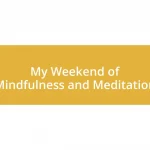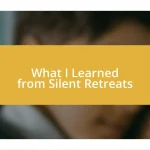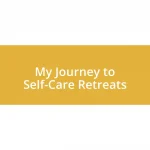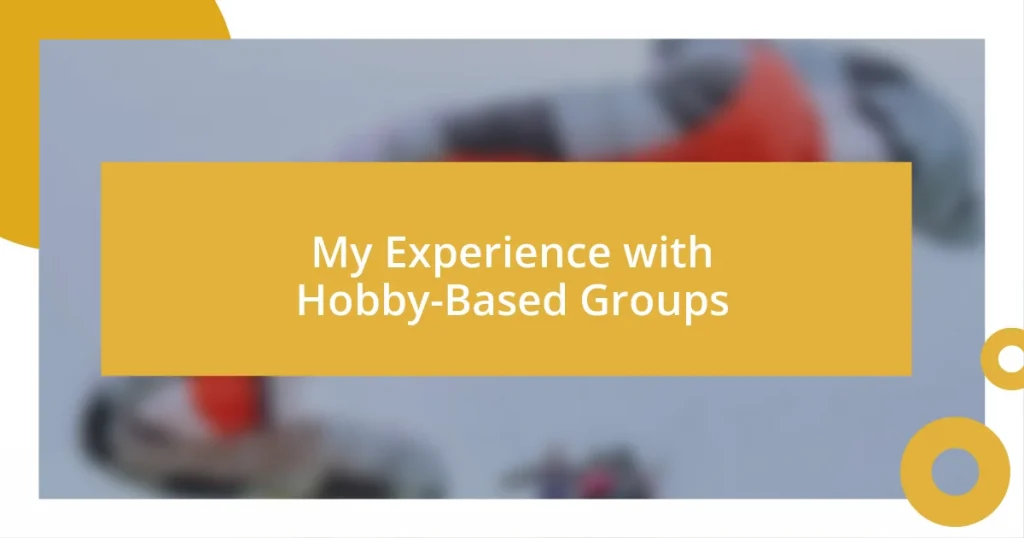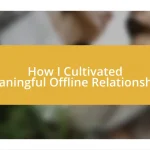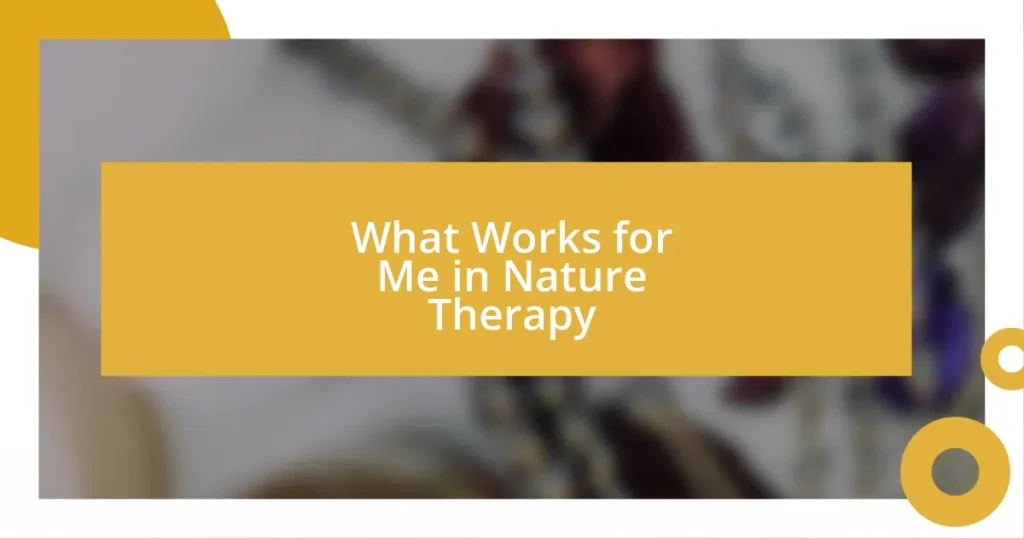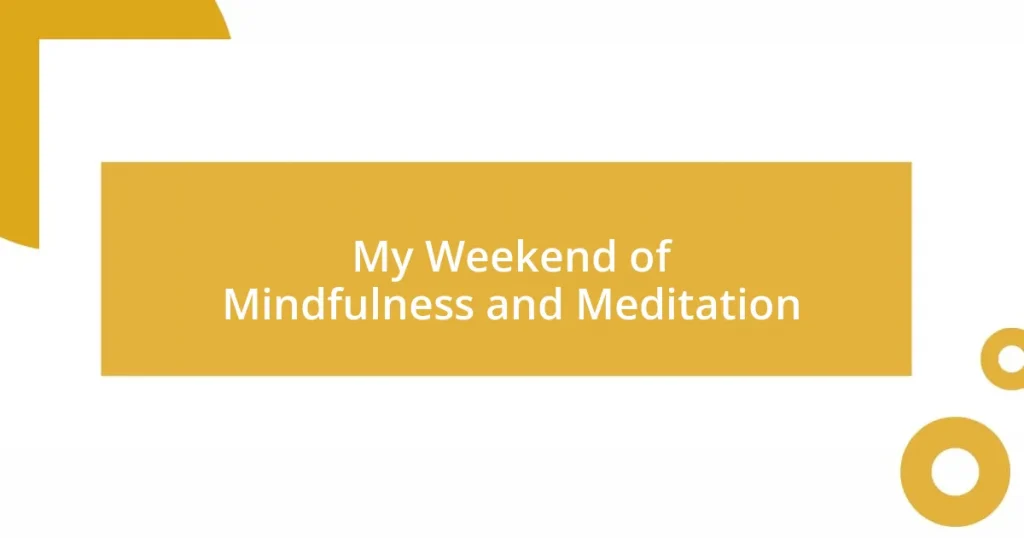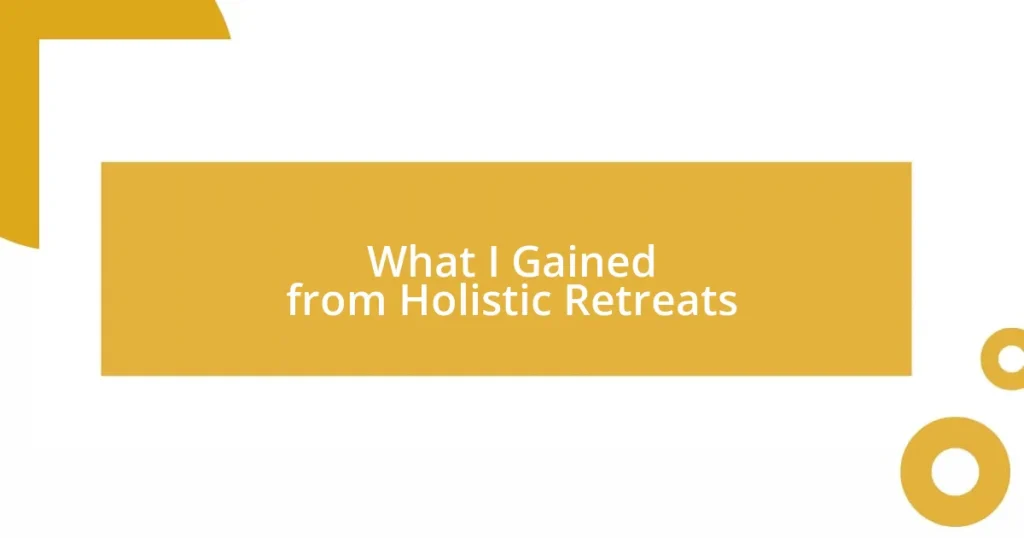Key takeaways:
- Hobby-based groups foster social connections, skill development, and emotional well-being, enhancing individuals’ confidence and sense of belonging.
- Proactive engagement and vulnerability in group settings lead to deeper relationships and a supportive community atmosphere.
- Overcoming challenges, such as communication barriers and differing commitment levels, strengthens group dynamics and fosters a sense of accountability among members.

Understanding Hobby-Based Groups
Hobby-based groups offer a unique sanctuary where individuals can connect over shared interests, creating both friendships and a sense of belonging. I remember joining a pottery class a few years ago; the excitement of learning alongside others who were just as eager to mold clay into beautiful shapes was unforgettable. Isn’t it fascinating how a shared passion can turn strangers into friends?
These groups foster collaboration and camaraderie, often leading to this electric atmosphere of creativity. When I participated in a local hiking club, I quickly realized that we weren’t just tackling trails but also sharing stories and motivations. Have you ever felt that rush of support when your fellow hobbyists cheer you on? It’s an incredible way to boost your confidence and explore your interests.
Moreover, hobby-based groups can serve as powerful environments for personal growth. I’ve seen members take on roles that challenge their skills, like leading workshops or organizing events. How often do we get a chance to step outside our comfort zones in our daily lives? With each new endeavor I embraced alongside my group, I noticed a ripple effect in my self-esteem and overall happiness.
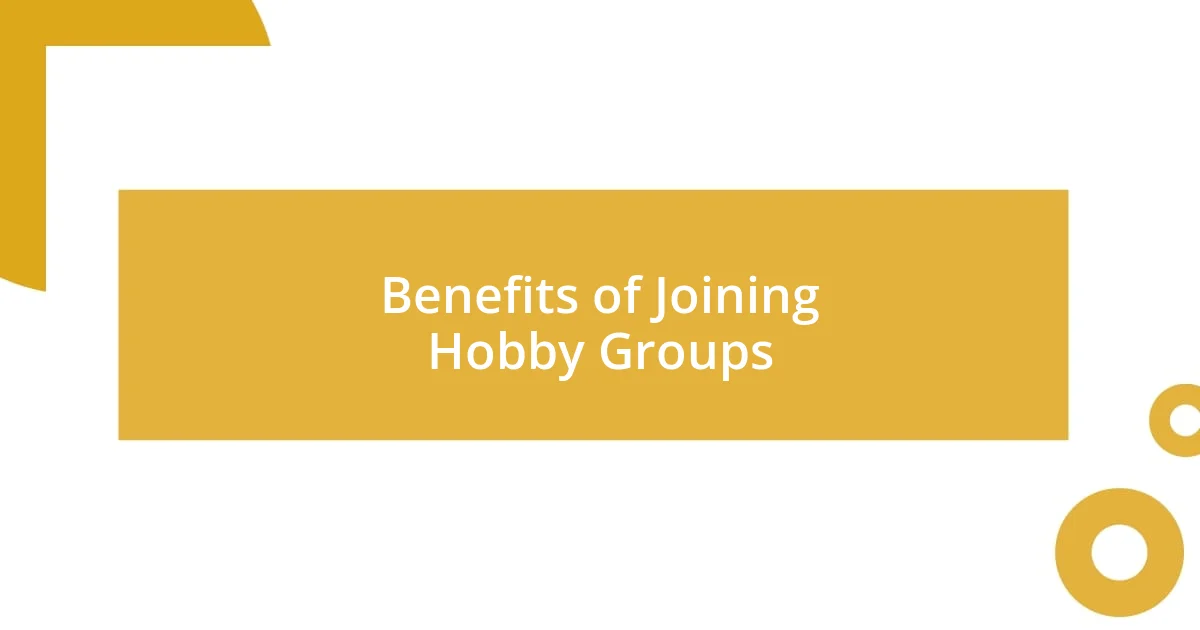
Benefits of Joining Hobby Groups
Joining hobby groups comes with a multitude of benefits that can enrich your life in unexpected ways. For instance, when I started attending a weekly painting class, not only did I learn new techniques, but I also formed lasting friendships with others who shared my enthusiasm for art. There’s something incredibly rewarding about spending an evening surrounded by individuals who inspire you and push your creative boundaries.
Here are some benefits I’ve personally experienced through hobby groups:
- Social Connections: Building friendships with like-minded people who share the same passion.
- Skill Development: Learning new skills from experienced members or through collaborative activities.
- Increased Motivation: Being part of a supportive community that encourages you to push your limits.
- Emotional Well-being: Experiencing joy and fulfillment through shared activities, leading to reduced stress levels.
- Networking Opportunities: Meeting individuals from diverse backgrounds, opening doors for personal and professional connections.
I’ve also found that belonging to these groups can turn hobbies into collaborative adventures. One summer, I joined a photography club where the enthusiasm was contagious. From weekend photo walks to spontaneous meet-ups, we not only captured stunning landscapes but also celebrated each other’s unique styles. The encouragement I received pushed me to experiment with my camera settings and creative composition, heightening my appreciation for the art form.
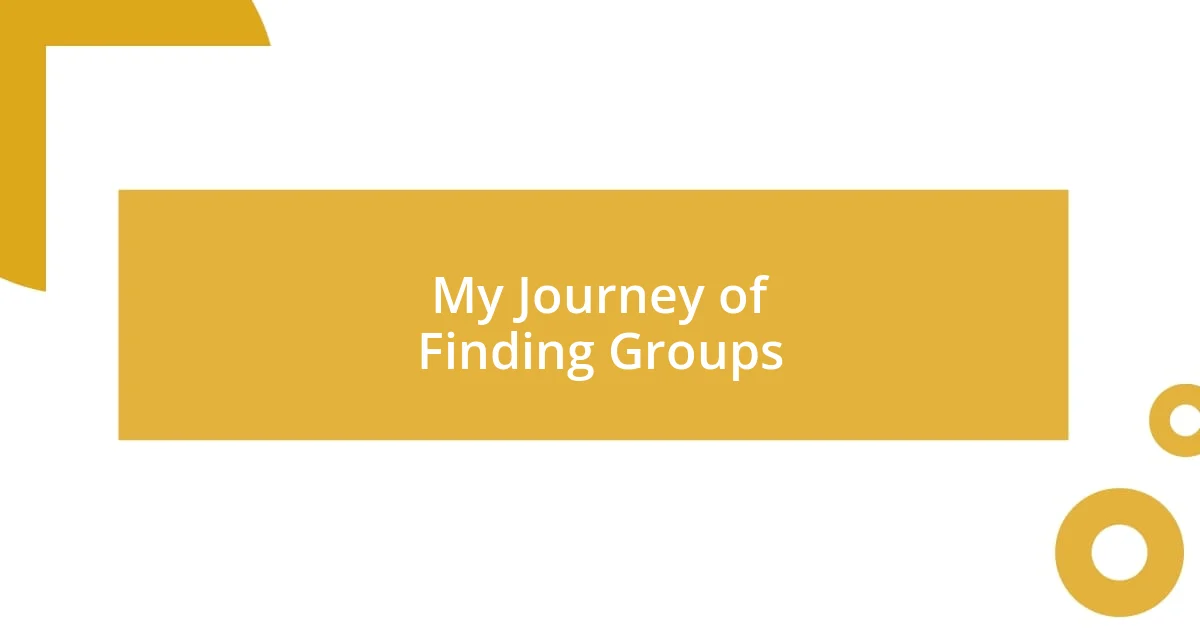
My Journey of Finding Groups
Finding the right hobby-based groups can sometimes feel like a treasure hunt. I remember spending countless evenings scrolling through social media, searching for the perfect book club. When I finally stumbled upon one that met at a cozy café, the warmth of the setting paired with the genuine excitement of discussing literature made all the effort worthwhile. Isn’t it amazing how the right space can ignite a passion?
I also faced a few hiccups along the way. At one point, I joined a dance group that promised to be exhilarating, but it turned out to be overwhelming instead. The vibe just didn’t resonate with me. After a few classes, I realized that it was okay to move on and seek another group that matched my energy and enthusiasm. This experience taught me the value of persistence—finding the right fit might take time, but it’s absolutely worth it.
As I narrowed down my options, I soon learned that connecting with individuals who share similar interests isn’t solely about the activities; it’s about finding companions who uplift and inspire. One memorable afternoon, while attending a gardening workshop, I was blown away by the knowledge and camaraderie among participants. Everyone was eager to share tips, swap plants, and encourage one another in our gardening journeys. That sense of community made all the difference in my quest.
| Journey Stage | Experience |
|---|---|
| Searching for Groups | Exciting but Challenging |
| Joining and Exploring | Sometimes Overwhelming |
| Finding the Right Fit | Joyful and Uplifting |
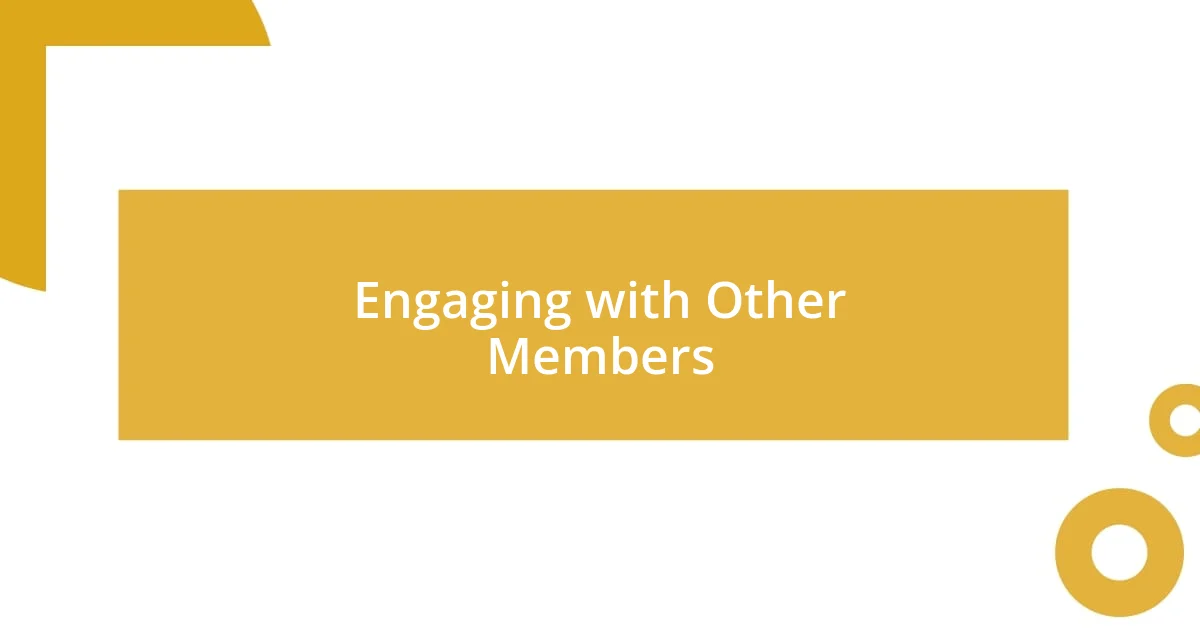
Engaging with Other Members
Engaging with other members in hobby groups can be a transformative experience. I remember one evening at a pottery class when I found myself anxiously sharing my first attempt at sculpting. The warmth of the feedback was heartening; rather than criticism, everyone offered tips and encouragement. That moment was a powerful reminder of how supportive communities can significantly boost our confidence.
During a cooking workshop, I had the chance to collaborate with others on a group recipe. I was amazed at how seamlessly we bounced ideas off each other, trying new flavor combinations and learning different techniques. It made me realize that these interactions deepen our learning and create memories, turning a simple class into a delightful culinary adventure. Have you ever paused to think about how sharing a hobby can transform it into a communal experience?
What I find truly special is the unspoken bond that develops over time. At a recent hiking group event, as we reached the summit, we celebrated not just the view but the shared experience of effort and adventure. These moments of triumph reinforce our connections, and I often find that my friendships in these hobby groups are among the most genuine. Isn’t it incredible how engaging with others can turn a solitary endeavor into a shared celebration?
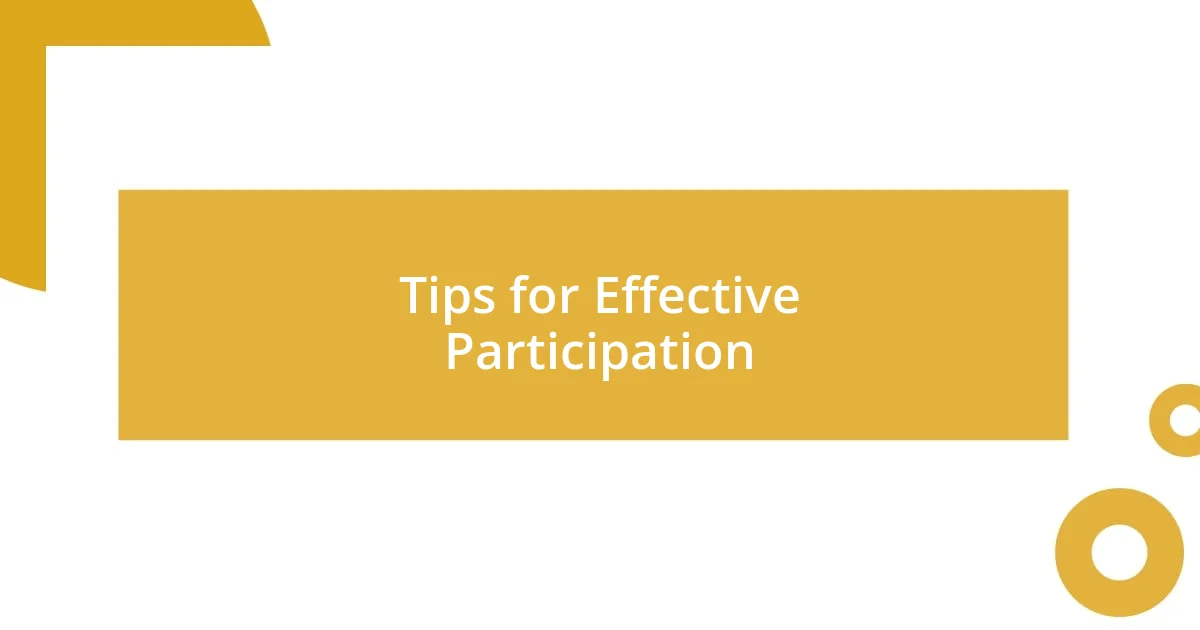
Tips for Effective Participation
To participate effectively in hobby-based groups, being proactive is key. I learned this firsthand when I began attending a local photography club. Initially, I would sit back and observe, but I quickly realized that asking questions and sharing my experiences made the discussions more dynamic and fulfilling. Have you ever felt hesitant to speak up? Taking that first step can really enhance your participation and help form deeper connections.
Another valuable tip is to embrace vulnerability. I recall a moment during a knitting circle when I nervously revealed my unfinished project, fearing judgment. Instead, fellow members rallied around me with encouragement and suggestions. That experience taught me that showing our struggles can invite support and foster a nurturing environment. Isn’t it amazing how opening up can transform our interactions?
Finally, consistency is crucial. When I committed to attending my local improv group regularly, it felt like I was slowly becoming part of a family. Each session built on the last, and I could see the impact of my presence in the discussions and performances. Have you considered how regular involvement in a group can deepen relationships? It’s like tending to a garden—the more you nurture it, the more it flourishes.

Overcoming Challenges in Groups
Overcoming challenges in group settings is more common than we often acknowledge. I remember a particularly tense moment during a group art project where we had conflicting ideas about our theme. Instead of letting frustration consume us, we paused and discussed our perspectives openly. That dialogue not only clarified our vision but also created a sense of shared ownership. Have you ever noticed how just talking things through can melt away tension and restore positivity?
One of the biggest hurdles can be communication barriers, particularly when group members come from diverse backgrounds. I experienced this firsthand at a writing group where some members used jargon specific to their own fields. Initially, it was intimidating, but I took it upon myself to ask for clarification. What I found was that this openness encouraged others to express their concerns too, ultimately enriching our discussions. Have you ever had a moment where seeking clarity transformed your understanding of a situation?
Additionally, dealing with differing commitment levels can strain group dynamics. During a nature photography club, I felt frustrated when some members didn’t contribute equally to our projects. Rather than letting it fester, I suggested we set clearer goals and timelines, which empowered everyone to participate and take accountability. Reflecting on that experience, I realized that fostering an environment where everyone feels responsible isn’t just effective; it deepens our collective investment in the group’s success. Don’t you agree that a strong sense of accountability can elevate a group from simply functioning to truly thriving?
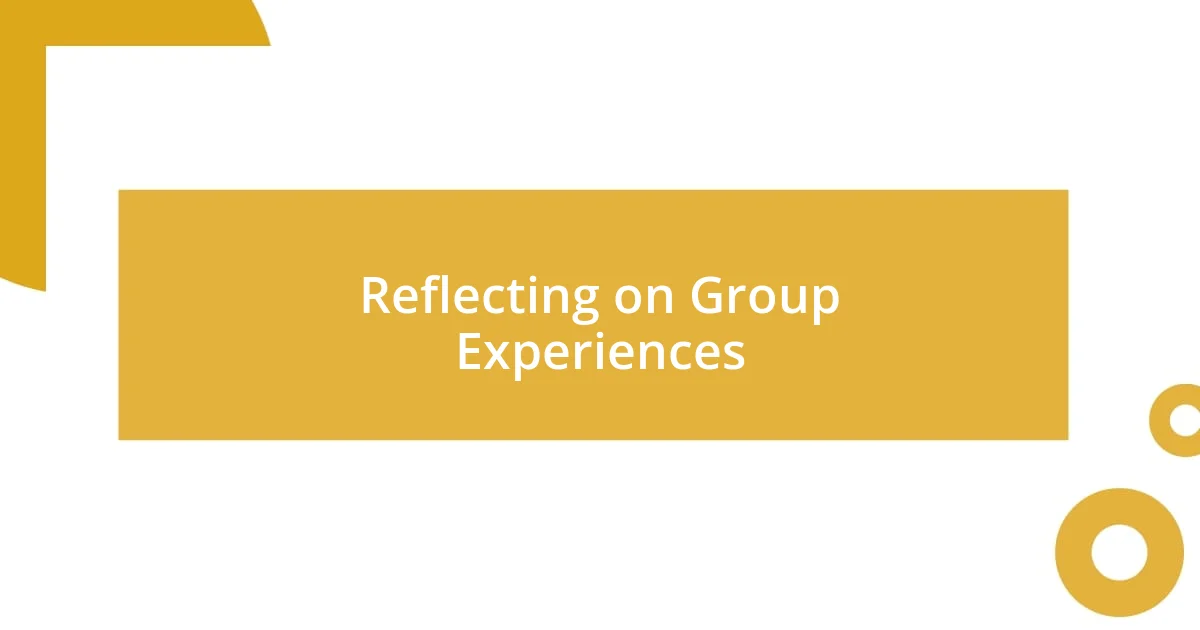
Reflecting on Group Experiences
Reflecting on my experiences in hobby-based groups, I’ve found that diversity can be both a challenge and a blessing. I remember the first time I joined a cooking class with people from different cultural backgrounds. Each person brought unique recipes and cooking techniques that not only enriched our meals but also offered me a chance to learn about their traditions. Did you ever think about how diverse experiences enhance our understanding of a shared passion?
I also learned that quiet moments in group settings can be powerful. During a recent book club meeting, there was a lull where everyone seemed lost in thought after a particularly intense chapter. I felt the urge to fill the silence, but instead, I chose to sit with it, allowing others to gather their thoughts. Surprisingly, this pause led to deeper, more introspective discussions. Have you ever realized that sometimes, silence can speak louder than words?
Moreover, my reflections on group experiences often bring me back to the importance of shared goals. I once participated in a community mural project where our collective vision guided the creative process. We faced disagreements, naturally, but those moments were enlightening. We learned to compromise, which taught me that finding common ground ultimately leads to stronger bonds. Isn’t it fascinating how working toward a mutual goal can transform individuals into a cohesive unit?

